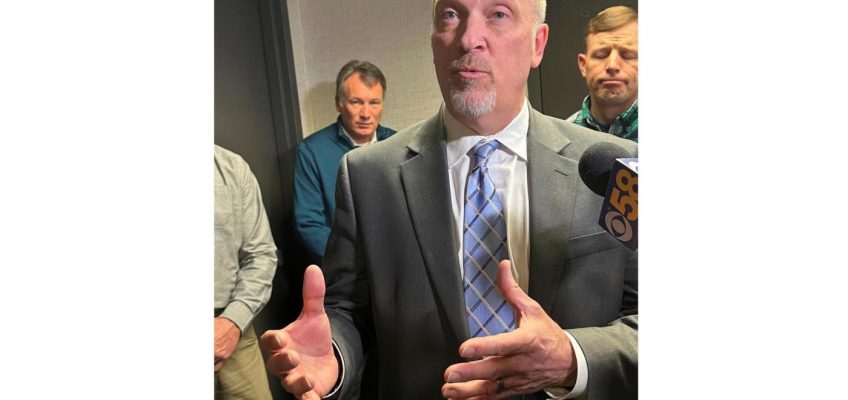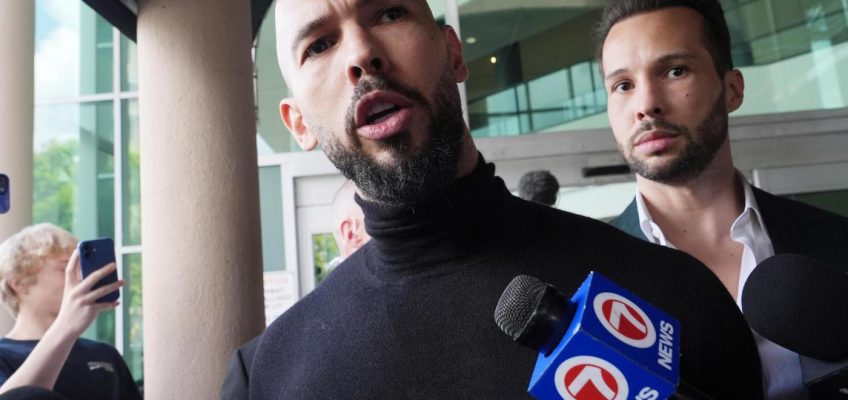By SCOTT BAUER
MADISON, Wis. (AP) — The Republican-backed candidate for Wisconsin Supreme Court accused the court’s liberal majority, all women, of being “driven by their emotions” during oral arguments in an abortion rights case — comments his challenger’s campaign on Friday called “disgusting.”
Related Articles
Supreme Court turns back challenges to laws keeping abortion opponents away from clinics, patients
Once off the table, bills to charge women who get abortions with murder get votes before failing
Republican states claim zero abortions. A red-state doctor calls that ‘ludicrous’
What to know about proposals to ban abortion pills and punish women who seek abortion
Threats follow Michigan lawmaker who said she had surgery to remove reproductive organs
Brad Schimel, a Waukesha County judge and former Republican attorney general, faces Susan Crawford, a Dane County judge backed by Democrats, in the high-stakes April 1 election.
Abortion has been a key issue in the race. Schimel opposes abortion rights and Crawford supports them. Both candidates have said they would be impartial if the issue comes before the court.
The winner will determine whether the highest court in the battleground state remains controlled by liberal justices as it’s expected to rule in cases affecting abortion, unions rights, congressional redistricting and election laws. The election could also serve as an early litmus test for Republicans and Democrats after President Donald Trump won every swing state, including Wisconsin.
Schimel spoke out against the four liberal justices during a Nov. 12 radio interview, the day after oral arguments in case challenging the state’s 1849 abortion ban. Crawford, who has been endorsed by Planned Parenthood, brought a different case seeking to protect abortion rights when she was a private practice attorney working for a liberal firm.
Wisconsin Supreme Court candidate Susan Crawford takes questions at a news conference, Tuesday, Feb. 25, 2025, in Madison, Wisconsin. (AP Photo/Scott Bauer)
Schimel’s comments were first reported Friday by the Milwaukee Journal Sentinel.
“There were times that when that camera went on several of the liberal justices, they were on the brink of losing it,” Schimel said on WSAU-AM. “You could see it in their eyes, and you could hear it in the tone of their voice. They are being driven by their emotions. A Supreme Court justice had better be able to set their personal opinions and their emotions aside and rule on the law objectively. This is — we don’t have that objectivity on this court.”
The four justices, in a statement Friday, accused Schimel of having “an antiquated and distorted view of women.”
“By suggesting that women get too emotional and are unfit to serve as judges and justices, he turns back decades of progress for women,” their statement said. “These petty and personal attacks have no place in our campaigns and courtrooms, and are just one more reason that we have endorsed Susan Crawford for Justice.”
The four justices are Jill Karofsky, Ann Walsh Bradley, Rebecca Dallet and Janet Protasiewicz. Bradley’s retirement created the open seat that Crawford and Schimel are battling over. The winner is elected to a 10-year term.
Schimel’s campaign issued statements from the two conservative justices who are women saying there was nothing wrong with Schimel’s comments and that their liberal colleagues were wrong to criticize him.
“The liberal majority lodges baseless accusations against Judge Schimel to deflect attention from inappropriate behavior on the bench by Justices Dallet and Karofsky,” conservative Justice Rebecca Bradley said. “Judge Schimel’s legitimate criticisms have nothing to do with gender — obviously he wasn’t talking about me, or Chief Justice Annette Ziegler — and everything to do with the liberal majority’s political activism.”
Ziegler said claims of sexism against Schimel were “baseless.”
Jacob Fischer, a spokesperson for the Schimel campaign, called the criticism a “pathetic attempt to gaslight voters.”
“There is no mention of gender in Judge Schimel’s criticism of the current majority that views the Supreme Court as a policy deciding body — instead of a fair and objective court,” Fischer said.
Schimel did not back down from his comments when asked about them Thursday following a public event in Milwaukee.
“It’s plainly clear that that one of the justices, at least, was not able to stay objective. She had lost control of her emotions,” Schimel told the Journal Sentinel. “Men do that, too, but she could not stay objective. In that case, she was literally yelling at an attorney.”
Schimel said he was referring to Karofsky. She did not immediately respond to an email seeking comment.
Crawford’s campaign spokesperson, Derrick Honeyman, said Schimel’s comments were “disgusting insults” and “part of a pattern of disturbing behavior and extremism that has no place in our state, and certainly not on the Wisconsin Supreme Court.”



